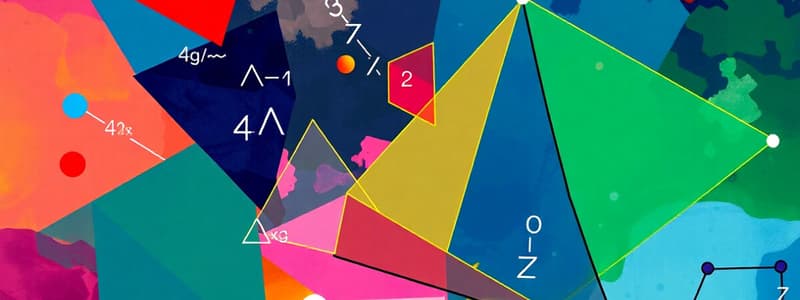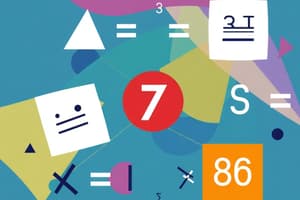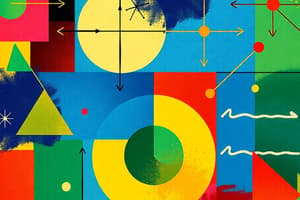Podcast
Questions and Answers
Which of the following operations is not commonly associated with algebra?
Which of the following operations is not commonly associated with algebra?
- Factoring
- Finding derivatives (correct)
- Solving equations
- Simplification
Which theorem is fundamental to understanding properties of triangles?
Which theorem is fundamental to understanding properties of triangles?
- Euclid's theorem
- Pythagorean theorem (correct)
- Binomial theorem
- Fermat's theorem
In calculus, what is the primary focus when dealing with derivatives?
In calculus, what is the primary focus when dealing with derivatives?
- Analyzing rates of change (correct)
- Calculating probabilities
- Finding the area under curves
- Studying integer properties
Which of the following is a key concept in statistics?
Which of the following is a key concept in statistics?
What is a significant application of number theory?
What is a significant application of number theory?
Which area focuses on structures that are fundamentally discrete?
Which area focuses on structures that are fundamentally discrete?
What is the primary focus of mathematical logic?
What is the primary focus of mathematical logic?
Which mathematical symbol represents summation?
Which mathematical symbol represents summation?
Flashcards are hidden until you start studying
Study Notes
Key Areas in Mathematics
-
Algebra
- Involves variables and constants.
- Key concepts: equations, inequalities, functions, and polynomials.
- Common operations: simplification, factoring, and solving equations.
-
Geometry
- Study of shapes, sizes, and properties of space.
- Key concepts: points, lines, angles, surfaces, and solids.
- Important theorems: Pythagorean theorem, properties of triangles, and circles.
-
Calculus
- Focuses on change and motion.
- Core concepts: limits, derivatives, integrals, and the fundamental theorem of calculus.
- Applications: optimization problems, area under curves, and rates of change.
-
Statistics
- Collection, analysis, interpretation, presentation, and organization of data.
- Key concepts: mean, median, mode, variance, standard deviation, and probability distributions.
- Important tools: hypothesis testing, regression analysis, and confidence intervals.
-
Number Theory
- Study of integers and their properties.
- Key concepts: prime numbers, divisibility, modular arithmetic, and theorems (e.g., Fermat's and Euclid's).
- Applications in cryptography and coding theory.
-
Discrete Mathematics
- Focuses on structures that are fundamentally discrete rather than continuous.
- Key areas: combinatorics, graph theory, algorithms, and logic.
- Applications in computer science and information theory.
-
Mathematical Logic
- Study of formal systems, proof techniques, and logical reasoning.
- Key concepts: propositions, predicates, quantifiers, and logical operators.
- Applications in computer science, philosophy, and linguistics.
-
Financial Mathematics
- Applies mathematical methods to financial problems.
- Key concepts: interest rates, annuities, amortization, and investment analysis.
- Tools: time value of money, present value, and future value calculations.
Important Mathematical Symbols
- +: Addition
- -: Subtraction
- × or ·: Multiplication
- ÷ or /: Division
- =: Equals
- ≠: Not equal to
- <, >: Less than, greater than
- ±: Plus or minus
- ∑: Summation
- ∫: Integral
- ∈: Element of
- ∀: For all
- ∃: There exists
Problem-Solving Strategies
- Understand the problem: Read carefully and identify what is being asked.
- Devise a plan: Choose appropriate strategies (e.g., drawing diagrams, breaking down the problem).
- Carry out the plan: Execute the chosen method step by step.
- Review/Check: Verify the solution for accuracy and completeness.
Mathematical Tools
- Graphing Calculators: Useful for visualizing functions and solving equations.
- Software: Tools like MATLAB, R, and Python for complex calculations and simulations.
- Online Resources: Websites and apps for practice and tutorials (e.g., Khan Academy, Wolfram Alpha).
Key Areas in Mathematics
- Algebra studies variables and constants, focusing on equations, inequalities, functions, and polynomials. Key operations include simplification, factoring, and solving equations.
- Geometry explores shapes and sizes, emphasizing points, lines, angles, surfaces, and solids. Important theorems include the Pythagorean theorem and properties of triangles and circles.
- Calculus examines change and motion through concepts like limits, derivatives, integrals, and the fundamental theorem of calculus. It is applied in optimization, calculating areas under curves, and analyzing rates of change.
- Statistics encompasses data collection, analysis, and interpretation. Key concepts include mean, median, mode, variance, and probability distributions, with tools like hypothesis testing, regression analysis, and confidence intervals.
- Number Theory delves into integers and their properties, emphasizing prime numbers, divisibility, and modular arithmetic. It has applications in cryptography and coding theory.
- Discrete Mathematics focuses on discrete structures rather than continuous ones, highlighting areas such as combinatorics, graph theory, algorithms, and logic, often applied in computer science and information theory.
- Mathematical Logic investigates formal systems, proof techniques, and logical reasoning, covering propositions, predicates, and quantifiers with applications in computer science, philosophy, and linguistics.
- Financial Mathematics applies mathematical concepts to financial issues, focusing on interest rates, annuities, and investment analysis. Key tools include calculations for present and future value.
Important Mathematical Symbols
- +: Addition
- -: Subtraction
- ×, ·: Multiplication
- ÷, /: Division
- =: Equals
- ≠: Not equal to
- <, >: Less than, greater than
- ±: Plus or minus
- ∑: Summation
- ∫: Integral
- ∈: Element of
- ∀: For all
- ∃: There exists
Problem-Solving Strategies
- Understand the problem by reading carefully and identifying what is being asked.
- Devise a plan by selecting suitable strategies, such as drawing diagrams or breaking down the problem.
- Carry out the plan by executing the chosen method step by step.
- Review and check the solution for accuracy and completeness.
Mathematical Tools
- Graphing Calculators: Useful for visualizing functions and solving equations.
- Software: Applications like MATLAB, R, and Python aid in complex calculations and simulations.
- Online Resources: Platforms like Khan Academy and Wolfram Alpha offer practice and tutorials.
Studying That Suits You
Use AI to generate personalized quizzes and flashcards to suit your learning preferences.




